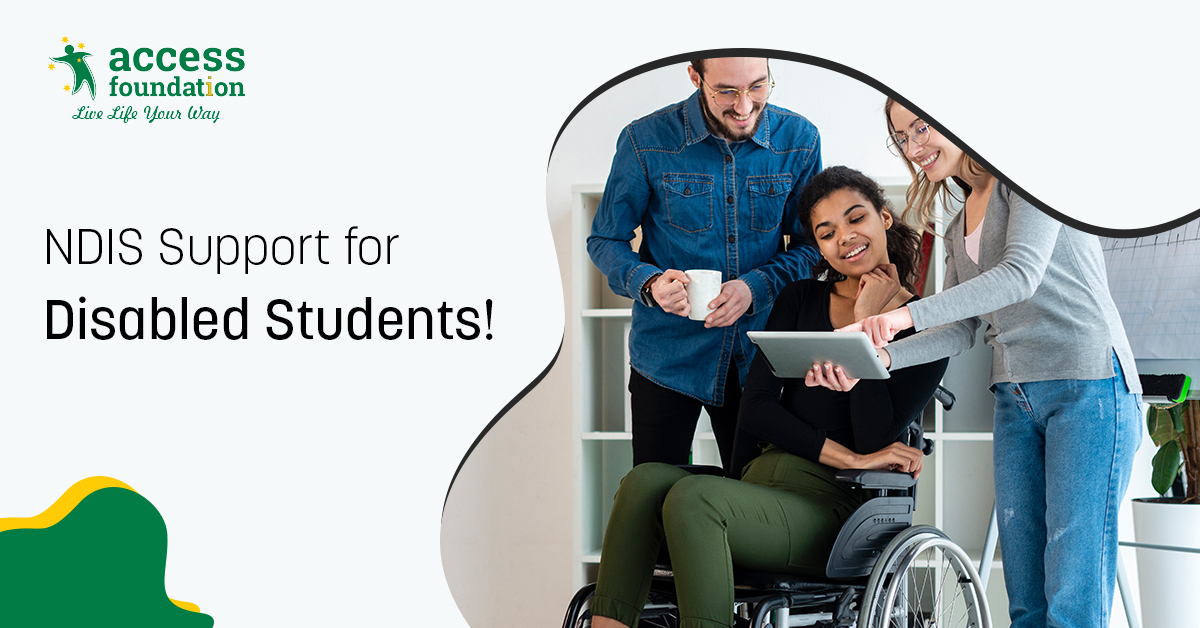
Types of NDIS Support Available for Students with Disabilities!
Remember your school days, how happy/sad and stressful those days were with regular classes, books, exams, etc. However, those days often become joyous with friends. Now, imagine the same for disabled children or students. Even with the same or more grandeur facilities, students with disability struggle to make every day and every moment count of their school days.
Let's be fair and practical; life is not the same for everyone, especially for those with disabilities.
Earlier, it was genuinely tedious for a student with disabilities to manage their school days while fighting physical and mental traumas. But now, with the National Disability Insurance Scheme, aka NDIS, things have turned out better for them.
NDIS is an Australian government initiative specially designed for disabled individuals. In this blog post, we will discuss those exclusive NDIS support services specifically designed for students with disabilities.
But first,
Are you eligible to access student support?
Before diving straight into the student support access, let's check the eligibility criteria for this segment. A student can access ndis support only if he/she falls under the following NDIS eligibility criteria:
Age must be above 9 and less than 65. If your children are younger than 9, an early childhood partner can support them before they apply.
The children must reside in Australia or have documents proving them/to be Australian citizens.
The children must have a permanent disability and require regular support for various activities.
Types of NDIS Support Access for Students with Disabilities
The process of accessing NDIS support for education involves multiple steps. Firstly, individuals must meet the eligibility criteria, which we have mentioned in the above eligibility section.
After being deemed eligible, a planning meeting is scheduled to assess the particular needs and goals of the student. This meeting is the basis for tailoring NDIS support to the individual, including their educational requirements.
Assistive Technology (AT) Support - Assistive Technology (AT) refers to specialized equipment, software, and tools designed to help individuals with disabilities in various areas. Such tools include screen readers, text-to-speech software , and modified writing instruments.
NDIS may fund purchasing specialized equipment like laptops with adapted software, communication aids, or other tools specific to a student's needs.
Transportation Assistance - Students with disabilities may face challenges with transportation, but the NDIS offers transport support to help them attend school without unnecessary barriers. The organization ensures transport costs related to attending school, including specialized transportation services if required.
Personalized Support - The NDIS follows an individual-centered approach, meaning that the types and amount of support provided to every student will vary based on their unique needs and goals outlined in their NDIS plan. This support may include assistance with personal care, mobility, and communication, which help students actively participate in their school environment and classroom.
Therapeutic Service - Students with disabilities often require therapeutic support to address their physical, emotional, or developmental needs. Depending on the specific requirements of a student, NDIS funding can be allocated to cover the costs of services such as:
Physiotherapy
Occupational Therapy
Behavior Support
This comprehensive approach recognizes that a child's academic success is closely linked to their overall progress and well-being.
Learning Support - Modifying physical spaces and teaching methods is vital to creating a comprehensive learning environment. This includes tutoring, personalized learning plans, and specialized educational resources tailored to individual learning styles and needs.
You can enable NDIS support to implement adjustments such as ramps, accessible bathrooms, and sensory-friendly classrooms to create accessible learning areas.
Plan Flexibility & Reviews - The NDIS is known for its flexibility, one of its biggest strengths. Support plans are not set in stone; they can be modified and reviewed as the student's needs change. This adaptability ensures that the NDIS support plan remains relevant and practical throughout the student's educational journey. Regular reviews ensure resources are allocated to individuals needing support.
Transition Support - Providing adequate support during transition is essential as students move through various stages of their education. This is where NDIS comes into play. It helps to ensure that children can move seamlessly between different educational levels, such as primary to secondary school or from school to tertiary education.
Final Thoughts!
Every child has the right to receive a fundamental academic education. It's understandable that for students with disability, attending school and coping with academic structures is daunting. But that doesn't indicate that they should left out to receive formal education. With some guidance and patience, they can outdo any regular students in academics.
Above are a few proven ways parents, teachers, and especially NDIS Support Coordinators can implement to help them thrive socially and academically. Many have implemented it lately and yielded fruitful results for their loved ones. It's time to learn, understand, and implement the process with your loved ones.
Partner with Access Foundation the most trusted NDIS Disability Provider in Perth for end-to-end support and guidance!

